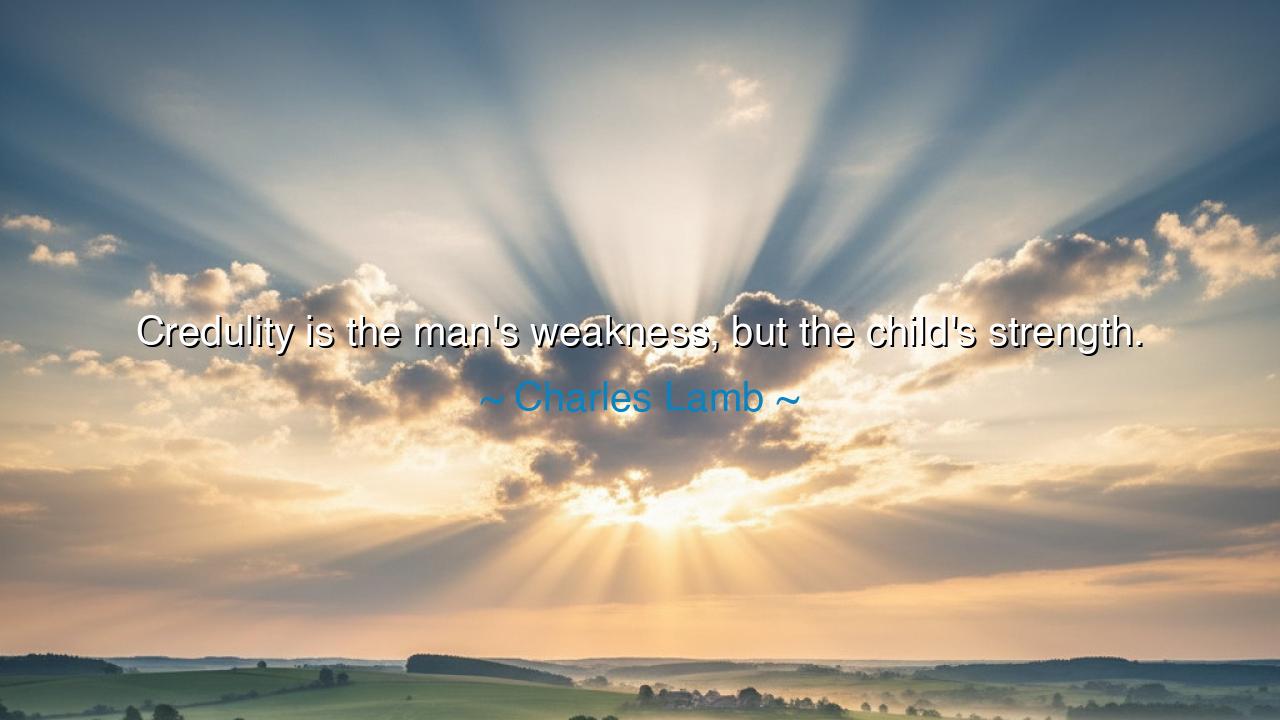
Credulity is the man's weakness, but the child's strength.






Hear the subtle wisdom of Charles Lamb, essayist of tender heart and quiet observation: “Credulity is the man’s weakness, but the child’s strength.” In this brief sentence lies a paradox, a truth that appears contradictory yet is eternal. For what is credulity, if not the willingness to believe without proof, to trust what one is told, to open the heart without suspicion? In the grown man, such credulity may be a weakness, exposing him to deceit and manipulation. Yet in the child, it is a source of wonder, of learning, of the very strength by which the soul grows.
The adult who believes blindly often stumbles. History is filled with examples of leaders and nations ruined by misplaced trust. Men who trusted false prophets, false science, or false promises have seen their lives shattered. For in adulthood, when reason is matured and experience is gathered, credulity becomes a dangerous flaw. It blinds judgment, dulls discernment, and leaves the man vulnerable to cunning hands. Thus, Lamb calls it rightly the weakness of man.
But in the child, credulity is holy. It is by believing what is told that the child enters the world of language, of story, of culture. The child who believes in the tales of heroes, of gods, of fairies, is not diminished but enriched. It is this strength of credulity that fuels imagination and gives courage to dream. A child who believes he can be strong one day may indeed become strong, for belief precedes achievement. Thus, what is weakness in the man is strength in the child: the open heart that accepts and grows.
Consider the story of Thomas Edison as a boy. His teacher once called him “addled” and unfit for learning. Yet his mother believed in him, and more importantly, he believed her belief. His credulity in her words—that he was capable, that he was intelligent—became his strength. As a child, he accepted encouragement without cynicism, and that belief carried him into inventions that lit the world. Here Lamb’s paradox reveals itself: credulity, when nurtured in youth, becomes the seed of greatness.
The ancients too knew this truth. Plato spoke of the necessity of shaping the soul of the young through myth before reason ripens. The child who believes in noble stories becomes noble in spirit; the one who doubts too soon becomes stunted. But when the man continues to believe blindly without testing truth, he falls into folly. Thus, the seasons of life demand different uses of credulity: in childhood, as strength for growth; in manhood, to be tempered by reason and discernment.
Understand, O seeker, that Lamb’s teaching is not a call to cynicism, but to balance. Retain in your heart the child’s openness, but temper it with the man’s judgment. Believe enough to dream, but question enough to act wisely. For without belief, the soul withers; without discernment, the soul is deceived. Wisdom lies in knowing when credulity is your strength and when it becomes your weakness.
Let this be your lesson: when guiding children, nurture their credulity—feed them stories of courage, kindness, and greatness, for these beliefs will shape their lives. But when guiding yourself as an adult, sharpen your discernment—test what you hear, weigh what you see, and let reason guard your heart. In this way, you honor both the innocence of the child and the responsibility of the man.
Thus is the teaching of Charles Lamb: “Credulity is the man’s weakness, but the child’s strength.” Embrace it rightly, in its season, and you will grow as both dreamer and thinker, preserving wonder without losing wisdom.






AAdministratorAdministrator
Welcome, honored guests. Please leave a comment, we will respond soon